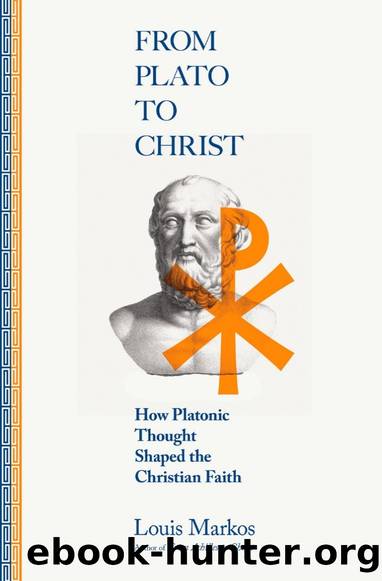From Plato to Christ: How Platonic Thought Shaped the Christian Faith by Louis Markos

Author:Louis Markos [Markos, Louis]
Language: eng
Format: epub
ISBN: 9780830853045
Amazon: 0830853049
Barnesnoble: 0830853049
Goodreads: 56356219
Publisher: InterVarsity Press
Published: 2021-05-20T07:58:20+00:00
In Republic, Plato forges a link between virtuous-rational-philosophic behavior and true happiness. Here, he forges a similar link but with reference, not to politics or morality or aesthetics, but to the form and purpose of the human body, which was fashioned to hold our soul. As human beings, male or female, we stand upright, with our headâthe center, for Plato, of both our reason and our soul, as the belly is the center of our appetiteâreaching upward toward the heavens. The beasts, in contrast, live with their heads close to the ground, a fitting sign for how their lives are controlled completely by their belly (appetite) and the impulses of their flesh.
In distinguishing between human beings and animals, it is significant that Plato insists that men were created before animals, and not vice versa as in the biblical account (Gen 1:24-28). By doing so, Plato posits that we are the pattern for all life on earth, even as the gods (angels) were the pattern for our own creationâthough we, Plato explains, are less purely mixed than the angels and thus subject to dissolution and decay.
Again, Plato does not clearly place man between the angels and the beasts as Christianity does; however, Timaeus does allow for the tripartite soul developed in Republic to be read in conjunction with a struggle between the beast below (appetitive) and the angel above (rational). Only when aided by the spirited part of the soul can the rational part control the bestial urges of the appetitive part.
This Platonic psychomachia, this internal war within the soul to put down the bestial side of our nature, would exert a profound influence on early and medieval theologians, giving them a language and imagery for the struggle that could complement, rather than contradict, the struggle between flesh and spirit that Paul describes in his epistles (e.g., Rom 7:18-25). Indeed, it will be the burden of part two of this book to trace not only that influence but the other and varied influences that Platonic thought exerted on the Christian faith.
Download
This site does not store any files on its server. We only index and link to content provided by other sites. Please contact the content providers to delete copyright contents if any and email us, we'll remove relevant links or contents immediately.
The Secret Power of Speaking God's Word by Joyce Meyer(3180)
Signature in the Cell: DNA and the Evidence for Intelligent Design by Stephen C. Meyer(3130)
Real Sex by Lauren F. Winner(3014)
The Holy Spirit by Billy Graham(2944)
The Gnostic Gospels by Pagels Elaine(2527)
Jesus by Paul Johnson(2352)
Devil, The by Almond Philip C(2324)
23:27 by H. L. Roberts(2248)
The Nativity by Geza Vermes(2226)
Chosen by God by R. C. Sproul(2161)
All Things New by John Eldredge(2159)
Angels of God: The Bible, the Church and the Heavenly Hosts by Mike Aquilina(1957)
The Return of the Gods by Erich von Daniken(1943)
Angels by Billy Graham(1922)
Knowing God by J.I. Packer(1854)
Jesus of Nazareth by Joseph Ratzinger(1811)
The Gnostic Gospel of St. Thomas by Tau Malachi(1793)
Evidence of the Afterlife by Jeffrey Long(1786)
How To Be Born Again by Billy Graham(1777)
